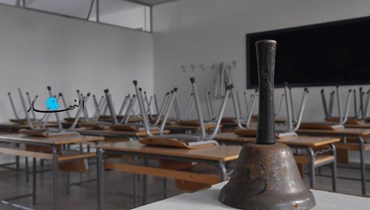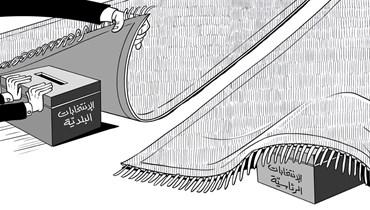Changing perceptions: Lebanese women take on new challenge
BEIRUT: The sweat of tradition is quenching the thirst of the Middle Eastern sun; but, in Lebanon, the sweat of many is being dried up by a cool drink served by a woman bartender in the thronged pubs of the nation’s capital.
In Beirut, some people find it promising to see women tending to a bar at a pub or nightclub, while others frown at the sight of it by attributing it to a men’s only profession.
Some may overlook it; others may judge it, placing the red, white, and green flag between openness and conservatism. The flag, not knowing where to direct itself, then confusedly wavers between both.
Breaking such norms, Mony Darwich enjoys mixing coffee with alcohol at Illy Cafeé in ABC’s newly opened branch of Verdun, as every drink she makes, advocates the right for women to do what they wish to do rather than what they must do.
“This profession is still frowned upon in my southern community even for men, yet, more so for women; but my parents approve of what I do and that’s all that matters,” Darwich tells Annahar.
Fia Camara, a writer and educator, highlights the country’s struggle for women’s freedom and oppression; she writes in the Huffington Post about her visit to Lebanon and about the issues that women still face in that part of the world.
“The situation in Lebanon is better for women only in some aspects and depending on where they live, on their social, and religious backgrounds: they can drive, go to school, work, drink and have more sexual freedom, especially if they live in or around Beirut because it is the more liberal part of the country,” she states.
Turning the statement to actuality, in the city’s nightlife scene, Rita Mansour is serving her signature cocktails, while another woman may have less freedom of choice in a more traditional setting.
Concern rears its head in the minds of many when asked about the idea of women bartending since they immediately worry about sexual harassment. Untangling the knot that ties victimhood to womanhood, Mansour says that sexual harassment is not a problem if the bartender sports a strong character.
“Customers ask if they can get my number. They flirt; the drunker they get, the more they do. But I stop them there because a girl standing behind a bar doesn’t give them a green light to ask for her number,” she adds.

Mirna, another woman bartender, who chose to remain anonymous, was a student when she first started tending a bar, and, to her, sexual harassment was an issue.
“I had a manager who harassed me once; but another time, I had one who protected me from harassment,” she says, proving that generalization is never fair when describing a situation and not all women bartenders face harassment.
“It depends,” she adds.
The strong roots that keep pulling the perception of women toward tradition are still tied to those who condemn the thought of having a woman mixing and serving drinks. They often accuse bar managers of hiring women bartenders to attract customers.
Along those lines, Camara refuses to contribute the freedom given to some women in Lebanon to a form of liberation, but rather a sexual objectification.
“The situation in Lebanon is very complex because women appear in the media, billboards and music videos wearing mini-skirts but it is not as a result of liberation but of sexual objectification and sexism. In fact, the objectification of the female body is present even in ads for foods such as fruits and vegetables,” she explains.
Mansour agrees that her looks may have contributed to attracting customers but she then adds that behind a woman’s appearance, there is also potential and skill that qualifies her as capable as men in the workplace.
“It is not just about looks! Bartending requires skill and anyone working behind a bar has to have signature cocktails, just like a chef,” she says.
She further noted how her manager hires a female bartender and a male bartender for the former to attract men and the latter to attract women, proving that it is not specifically tied to women.

Fighting sexist remarks, Darwich shares her discontent with the fact that “customers doubt the ability and skill of a woman bartender; they enjoy the sight of one behind the bar, but they prefer being served by men, which is so sexist.”
Her words are shared by many, even Mansour states that “being a girl makes the manager think that I can’t handle the pressure, but I always prove them wrong.”
Despite all of this, Camara still considers Lebanon to be far from a feminist paradise.
“Although many brave Lebanese women have worked hard to change that discourse in the country, they still face a lot of discrimination and challenges,” she thinks.
A report done by The Guardian studies the male perception of women in the region by selecting male participants from Egypt, Morocco, Palestine, and Lebanon and giving them a ranking on the Gender Equitable Men (GEM) scale.
Egyptian survey respondents reported the lowest scores on the scale while Lebanese respondents reported the highest in terms of their perception of women’s societal roles.
Be that as it may, “Male attitudes towards the role of women in the workplace and at home, and of their participation in public life, were stereotypically sexist in the study of views in Egypt, Lebanon, Morocco, and Palestine,” states the report.
When asked to compare women bartenders to hostesses, Mansour explains how bartending is far more creative and how beauty is not the only factor that qualifies a woman as a fit bartender.
“Any girl can be a hostess but not any girl can be a bartender since it’s a profession that requires talent and creativity. It is wrong to assume that a woman’s looks are what classify her to tend a bar,” she tells Annahar.


 اشترِك في نشرتنا الإخبارية
اشترِك في نشرتنا الإخبارية


























